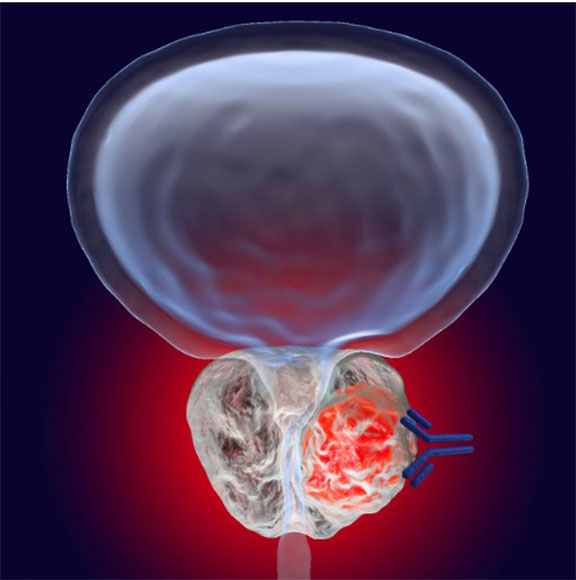
Mega Doctor News
Newswise — The immune checkpoint protein B7-H3 may be a promising new target for immunotherapy in treatment-resistant prostate cancers, according to two new studies led by researchers at the Johns Hopkins Kimmel Cancer Center. The studies were presented recently at the European Society for Medical Oncology (ESMO) 2021 Conference.
“Virtually every prostate cancer cell expresses some degree of B7-H3, which is appears to be associated with rapid recurrence and earlier metastasis,” says Eugene Shenderov, M.D., Ph.D., the lead author of both studies and an assistant professor of oncology at Johns Hopkins. However, prostate cancer cells do not express much PD-L1, a protein targeted by FDA-approved immunotherapy agents used for melanoma, non-small cell lung cancer, bladder and kidney cancers, among others, which could explain a less robust response to these therapies in patients with prostate cancers.
Immunotherapy agents known as “checkpoint inhibitors” unlock specific molecules that act as handcuffs preventing the body’s natural immune system from fighting cancer cells. When these restraints are lifted, immune system T cells can wake up and attack cancer cells.
The first study (abstract #627) was a phase 2 trial of the anti-B7-H3 antibody enoblituzumab in 32 patients with localized prostate cancer who were scheduled to undergo prostate removal surgery. Patients received six weekly infusions of enoblituzumab prior to surgery. Investigators then compared biopsy samples taken at diagnosis with the removed prostates to study changes to tumor tissue. Some patients had notable declines in their prostate specific antigen (PSA), which is a measure of cancer severity, and there were more functional immune cells seen after treatment with enoblituzumab, indicating a change in the tumor microenvironment.
The second study (abstract #620) was a phase 1 study — a study aimed at determining the toxicities associated with a new drug therapy — evaluating an experimental agent called MGC018 in solid tumors. The drug contains an anti-B7-H3 antibody with an anti-cancer agent called duocarmycin, which allows the drug to deliver the duocarmycin payload directly to tumor cells expressing B7-H3. Among the patients studied were 39 who had metastatic castration-resistant prostate cancer and who already had undergone prior treatment with chemotherapy and hormonal therapies. They received increasing doses of the therapy every three weeks. Among 39 patients who were evaluated by the study poster cut-off date, 21 patients (54%) had a prostate specific antigen (PSA) reduction of more than 50% from baseline, and four of 16 patients who were evaluated for radiographic response had a partial response, meaning their cancer partially responded to treatment. PSA is secreted by prostate cancer cells and presence is utilized as a biomarker of disease burden. Over half of all patients studied experienced severe or life-threatening (grade 3 or higher) adverse events, indicating toxicity will need to be reduced in further drug development. This included patients with non-small cell lung cancer, melanoma, triple negative breast cancer, and head and neck squamous cell cancer.
“Everything seems to point to the fact that B7-H3 is potentially an important therapeutic target in the prostate cancer setting,” Shenderov says. He and his colleagues are planning a clinical trial to study combination therapies targeting B7-H3 to determine if that further boosts immune response.













